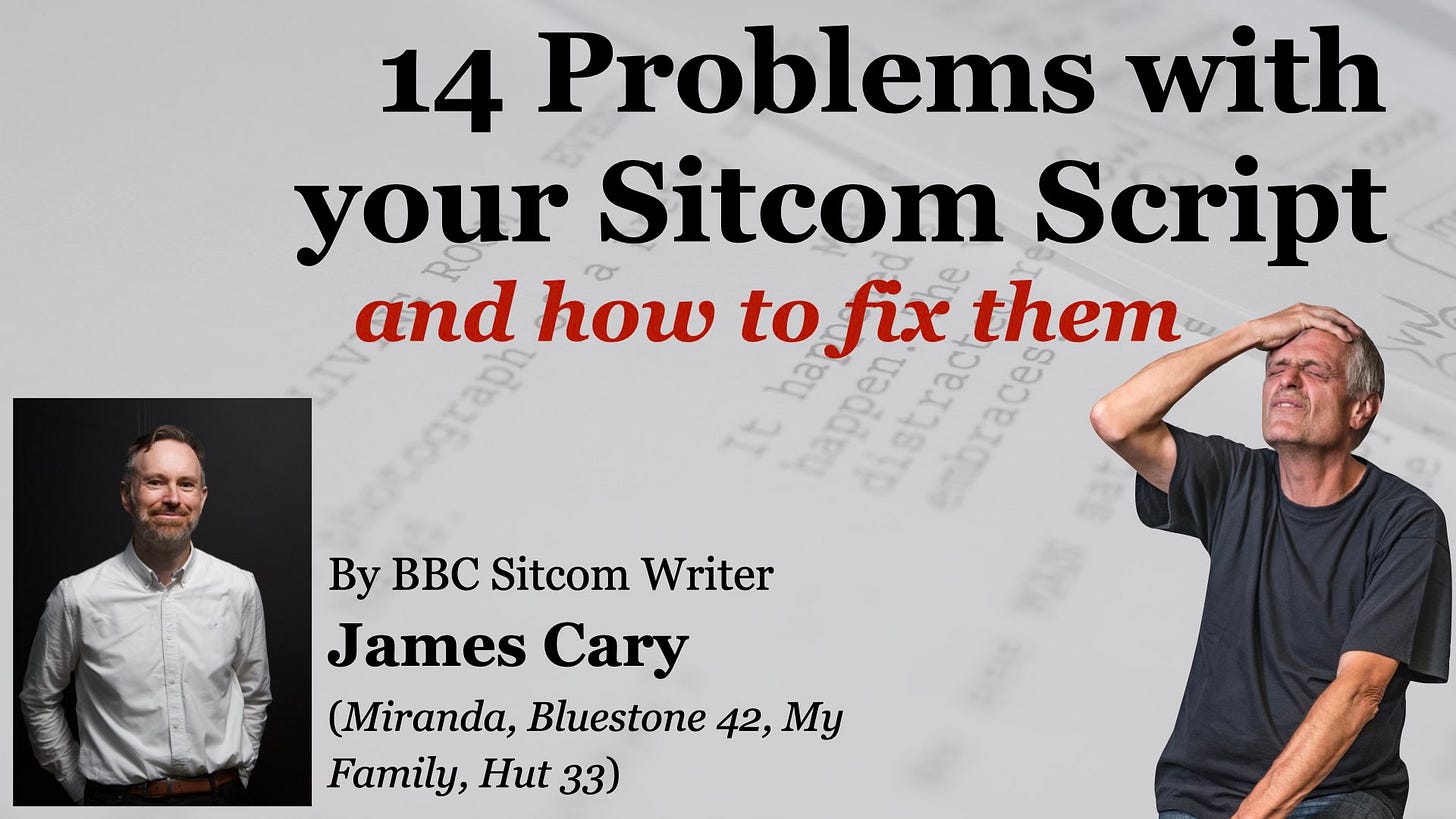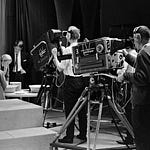If you're giving notes on a script, it’s worth asking yourself ‘Am I trying to help the writer achieve their vision? Or am I trying to change the writer’s vision?’ It may be the latter, and that may be entirely justified and reasonable given the state of the script, but one needs to have an honest conversation about that. In fact, one should probably have had an honest conversation about it earlier at the outline/treatment stage.
But you didn't read the treatment properly, did you?
Because the treatment, or Scene by Scene Outline, was 1500 words of dense text. That’s why I’ve spaced out these lines.
So that you’ll actually read them.
Okay? Still with me? Good.
I’m being harsh here. We’re all busy, and long outlines are not exciting to look at. They can be hard to read and understand. Getting to grips with this kind of document is not as easy as it sounds.
Nor is commenting in a constructive way. The art of giving notes does not come naturally to most of us. It’s not just saying what you think. Your reactions are essentially useful, but they need to be processed and filtered. Knee-jerk remarks are often unhelpful or confusing.
So let’s look at this from the note-getter’s point of view as we take a silly example.
Theme Parks Aren’t Funny
A writer receives some notes on a script they’ve written. Some characters go to a theme park in the second act of the episode. Maybe it’s a second draft of a script. And they’re given the note along the lines of ‘Does it have be a theme park? Maybe it could be a zoo. Or a themed hotel?’
What is a writer meant to make of that note? There could be any number of reasons for it – which could be that the note-giver knows for a fact that theme parks are expensive to film in; or had a bad experience at one as a child and never liked them; or has some hare-brained notion that ‘Theme Parks aren’t funny’.

If an experienced executive producer says that ‘Theme Parks aren’t funny’ and then makes a case for it, I’m all ears. You’re a fool to ignore the advice of someone with decades more experience than you. You could make the case, for example, that ‘Fashion Shows aren’t funny’. The reason for that, you could argue, is that they are already inherently preposterous. It’s normally funnier to make something run-of-the- mill preposterous. But the skill of good writing is that it finds new ways to do all kinds of things. I'm sure there's a funny Absolutely Fabulous scene or two at a fashion show.
Writers needs to ask themselves what each line is doing and how the audience is meant to react. Likewise, note-givers need to interrogate every note they give.
A different scenario will illustrate another common note-giving problem: tact.
Bottle Episodes
Let’s say you’re writing Series 2 of your sitcom. You decide you want to do a ‘bottle’ episode, which is a term for an episode where all the characters are trapped in one confined place for a whole episode. It’s a fairly standard sitcom trick that makes writers feel like they’re being clever. It’s often a broken lift, but it can be an overnight prison lock-in (Porridge), a psychiatrist’s office (Miranda) or a Chinese Restaurant where a table is never available (Seinfeld). So far so traditional.
Initially, producers like episodes like this because they’re cheap to produce. If you’re in a studio, you probably don’t need any location filming at all - and ideally no outside characters. Budget saved. Tick. Line producer happy. Writer happy. And actors normally love this sort of episode too, because it feels like theatre – which everyone respects more than TV for some reason – and someone might have an emotional breakdown or a big character revelation. Aah, the sniff of awards.
An exec, however, is probably going to worry that the episode is going to be boring, which I’ll admit can be a real danger with this kind of sitcom plot. But, rather than say that the show is going to be underwhelming, the notes make various tactful suggestions about ‘opening out the episode’ and ‘moving things on’ – which are the only thing the episode can’t do given its parameters.
It’s clear from the subtext of the note that the exec/producer/channel has lost confidence in the idea and thinks that either you don’t have the talent or experience to pull off this episode – and that you’ve written a tiresomely derivative, unfunny Beckett play – or that the audience don't have the attention span. They may well be right about one or more of these things. It may well be that you, the writer, have given yourself an impossible task in you bottle episode, so you might do well to rethink the whole thing.
Let's stop being British, tactful and embarrassed. Notes need to be clear and honest. That is the only way they can be constructive. But notes also need to be timely – this conversation about the troubled bottle episode should have been had way earlier, before the writers spent three weeks sweating over the first two drafts of this script, so don't be surprised if they're now wedded to it and resistant to major changes. Bottle episodes always run into problems like this, so have the conversation at the outline stage - ideally even earlier.
TV is made fast, and there's never enough money, no matter how big the budget. It’s a collaborative medium. Therefore, trust is essential. Notes which don’t say what they mean don’t help this. So, if an episode idea, scene or moment has been agreed upon, let’s all try and find a way of making it work, rather than undermining the entire process with oblique comments that don’t really help anyone. Otherwise, we need to be honest enough to say ‘This isn’t working, and isn’t going to work. So let’s have a new idea’.
Let’s carry all this over into a list of passive-aggressive points. Here are the Seven Deadly Sins of Giving Notes to a Comedy Writer:
1. Skimming
I’m sure you’ve read the script properly. Twice. Including all the action lines and stage directions. And that you didn’t give it a quick look on the tube on your iPad. This script took me at least three solid weeks to write. A week of storylining and planning, a week of writing and another week of rewriting. That’s maybe 75 hours of graft and screaming at the wall. Could you spend 75 minutes so that you’re sure of your ground when talking about “the moment you feel is lacking” – and I have to point out that the moment is there on page 23 and seems to have been missed. Need I go on?
2. Blanking
You’ve somehow blanked our last meeting out of your mind, and now you are now giving me a note that flatly contradicts something you said before. I defended this in the previous chapter, and I know you’re busy and are execcing a number of projects – and I’ve script-edited shows and made this mistake – but it is incredibly annoying to be on the receiving end of it. Because you have no memory of what you said at the last meeting, I now have to pretend that you haven’t just contradicted yourself, otherwise I’m going to sound defensive. And now I don’t know what to think. Alternatively, you know you’re telling me the opposite of what you said before and you're not admitting that the advice last time was bad. That’s fine. Admit you made a mistake – and I’ll admit that some of my jokes are crap.
3. Second-Guessing
Please don’t give me notes based on second-guessing what your boss’s boss's boss wants. That’s too many variables and an utter waste of time for both of us. By the time we’ve finished the script, at least one of those personnel will have changed, so the whole endeavour of second-guessing is utterly pointless. Do you like the script or idea that’s in front of you? If you do, back it. Sell it. Champion it. Channels don’t know what they want until they see it. You know that. I’m sure they didn’t think they wanted The Office, or Miranda, or The Royle Family – until they read a script or saw a pilot. They didn’t go out looking for sitcoms about offices, tall women or families that sit around watching TV, but that’s what they got. And that’s what worked. And what the audience wanted. If you like the creative vision of a project, pursue it and hone it. There is no point in changing it because ‘everyone’s into pirates right now’. If you don't like the idea in front of you, say so, let's draw a line under it and think of something else.
4. Over-Worrying Version 1
Do you get the joke? If you do, don’t worry that other people won’t. Don’t assume the audience is dumb. If you’re asking “I’m not sure people will get that reference? Have people heard of that?" stop and ask yourself why you’re sure you’re better informed than your audience. Are we assuming that because we work in television, we’re smarter than average? Hey, all the smart people are making tons more money than us being doctors, lawyers and bankers. We’re the idiots. If you get the joke, it’s probably fine, isn’t it?
5. Over-Worrying Version 2
There’s a jokey reference to something you don’t get. And you’re assuming no one else has heard of it. But maybe the joke got a laugh at a readthrough and you’re still worried about it. You think that the audience needs to get every single joke in the show. They don’t. They really don’t. Every episode of Friends and The Simpsons has a couple of jokes which refer to American stuff that we’ve never heard of. And it doesn’t matter. If the pace is going, and especially if it’s a throwaway line, it really doesn’t make any difference. Let it go. It’s funny.
6. Dictating Taste (arguably, Over-Worrying Version 3)
There’s a joke you get. And everyone else gets it. That’s not the issue. The issue is that you don’t like it. That’s fine. You don’t have to like every joke. If the writers like it, and it’s consistent with character and plot, what’s the problem? Sometimes, people can get really hung up on a joke. If you can’t explain why it’s a problem, and how it’s going to diminish the show – rather than mar your own personal enjoyment – state your preference and move on.
7. Glibbing
Writing is hard. Really hard. Harder than sitting through departmental meetings wondering where you’re going to find the next Russell Brand/Russell Howard/Miranda Hart. You’ve read enough scripts to know that the best ones make writing look easy. But you know better than most that it’s not. So please don’t say things that imply writing TV sitcoms is easy. Here’s the main one: ‘It basically writes itself.’ It doesn’t. It really doesn’t.
Plenty of disputes and issues will be resolved at the next stage anyway – if the script gets that far. That stage is The Readthrough.
That’s one for next time. If you can’t wait, get Writing Your Sitcom here as an e-book here or get the audio version here. By doing that, you also help keep this blog weekly and free.
And if you want to cheat and give notes on a script that are probably right whether you’ve read the script or not, why not get this resource I produced, on 14 very common problems with script. Why not get this 50-page PDF that comes with a 90 minute webinar which gives you 14 ways a script can improve?











